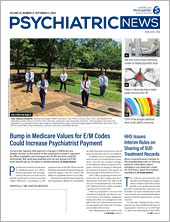Our colleagues Drs. Steven Starks, Thara M. Nagarajan, Rahn Kennedy Bailey, and Danielle Hairston in “Racism and Inequities in Health Care for Black Americans” (
Psychiatric News) asserted that the field of psychiatry has helped to maintain the structural foundations of racism in America, and it will take action on the part of all of us to bring justice. We have a lot of work to do. One aspect of that work is in the criminal justice system.
Psychiatry, more than any other medical specialty, interacts with, participates in, and shapes the philosophy of our criminal justice system. Through an assignment by the National Health Service Corps, I worked as a staff psychiatrist and then the medical executive director of a maximum-security prison in the early 1990s. My duties required me to make weekly rounds—cell by each cell—of 300 men in solitary confinement and another 305 men on death row. I witnessed the inequities of the application of the death penalty. I have also witnessed the role of psychiatry and the house of medicine in maintaining capital punishment in America. In reflection, I condemn myself for the role I played in assessing competency for appeals while clinical director of a forensic state hospital in the early 2000s.
Bryan Stevenson in Just Mercy argued that the death penalty in America has evolved into legalized lynching. He describes the rise in capital punishment in Southern states and the multiple examples of flimsy evidence and biased proceedings leading to the execution of Black men.
Up until the execution of Mark Assay in 2017, no white man in Florida had ever been executed for the murder of a Black man. In the United States, 165 men have been exonerated of their death penalty convictions, and in Florida, of the 29 exonerees, 19 were Black.
The death penalty is a lie; it does not deter murderers from killing, it is not necessary to protect the public from those rightfully convicted, it is unfair in its application by race and geography, and it does not bring about healing. The death penalty is homicide by court bringing satisfaction for hate, revenge, and white votes.
Psychiatry has longed served in a gatekeeper role for capital punishment. Psychiatrists contribute to who goes to trial, who deserves to die, and who can be executed. The APA position statement on the death penalty has merely reaffirmed a request for a
moratorium on capital punishment until such time it is administered fairly.
Efforts to reform capital punishment in the 44 years since Gregg v. Georgia have proven that the system is incapable of administering the death penalty fairly. All psychiatrists as individuals and psychiatry as a field have the opportunity to strike down one pillar of systemic racism by demanding that their elected officials—including sheriffs, district attorneys, state legislators, and governors—end the death penalty. Its abolition is a necessary start toward justice and peace in the fight against racism. ■
JOSEPH E. THORNTON, M.D.
Gainesville, Fla.
Dr. Thornton is a board member of Floridians for Alternatives to the Death Penalty. References available upon request.
